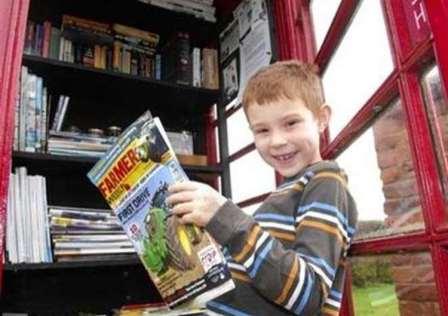They may be disappearing across the country but residents in Kent have come up with unique ways to save our iconic red phone boxes. At one point there were at least 400, but thanks to the introduction of mobile phones only around 25 remain and there have been determined efforts to ensure no more are culled.
Several have been turned into life-saving defibrillator stations as local groups seek to put them to good use. Now with plans emerging to turn one in Bearsted into a book swap shop, we take a look at some of the county’s more unusual phone boxes.

Adam Smith in the Bodsham phone box library
Villagers in Bodsham may lay claim to having started the county’s trend for converting red phone boxes when they turned theirs into a mini library in 2012. It was saved after being among 400 culled by BT in 2008. Residents quickly embraced the idea and handed over books and magazines they no longer had a use for, while others sold plants and jars of green tomato and apple chutney. Nutty Thrupp used the proceeds to raise money for the Vanessa Grant Trust, which helps support handicapped children in Kenya.
Plans are currently underway to save a red telephone box in Deal at risk of being decommissioned by British Telecom. Beverley-Jayne Last, Kerry Banks, and Chrissi Dunn, were inspired to set up a fundraising campaign after around 400 residents suggested it be turned into a combined Public Access Defibrillator site (PAD) and community library. They have written to Deal Town Council asking them to consider being the official ‘adoptees’ of the box, in Alfred Square, at a cost of £1.
MP Charlie Elphicke pledged to help with the negotiations with BT and £150 has already been raised. Book lover Abegael Tomlin has been working with Chartham parish council to turn the village green’s run-down phone box into a miniature library. The 22-year-old, who works as a veterinary assistant, was searching for a spot to set up a community book swap after spotting one in Chestfield.
She earlier told KentOnline: “I knew we had a phone box on the green that doesn’t get used very much, and I thought that’s a nice place for it.”
The parish council needs permission from BT to adopt the booth, and the plan is to fill it with books the community can then borrow.
Resident Sally Devere raised £1,750 to set up a life-saving defibrillator in a converted red phone box in Herne Bay High Street. It is still going strong despite being vandalised twice in the space of three months. A vandal urinated inside the phone box and ripped its hi-vis jacket to shreds in February before thieves attempted to steal the lifesaving equipment in May. Ms Devere has been lobbying the council to install a CCTV camera close to the converted phone box to try and prevent future attacks.
Life-saving devices have also been set up in converted red phone boxes in West Malling, Aylesford, Broadstairs, Lydd and New Romney – although the latter were also targeted by thieves.
Meanwhile, who could forget artist Joe Sweeney set up Brexit phone booth in Romney Marsh as part of interactive digital art project. It gave Brexiteers and remainers an opportunity to say goodbye to the EU in the run up to the original UK leaving date in March. Hundreds took the opportunity to do just that, including famous faces such as fashion designer Vivienne Westwood, former Green Party leader MP Caroline Lucas, and London Mayor Sadiq Khan.

The ‘Brexit’ phone box in Dungeness. Picture: Dan Glasser, courtesy of Joe Sweeney and Cob Gallery
The ‘+44 Leave a message for Europe’ project was inspired by a 1990s phone box, and its location in Dungeness – the UK’s most south-easterly point and Britain’s only desert – was deliberately chosen by Mr Sweeney to create a physical and poetic metaphor for the current, confused and uncertain, climate.
Fancy having your own phone box? Well, you can get your hands on one for just a £1.
BT has been offering residents in the south east the opportunity via its Adopt a Kiosk scheme.
At least 3,000 have already been adopted and turned into mini-libraries, miniature art museums, cake shops, information centres, and one in Devon was transformed into the “world’s smallest nightclub”.
For details on how to apply to click here
